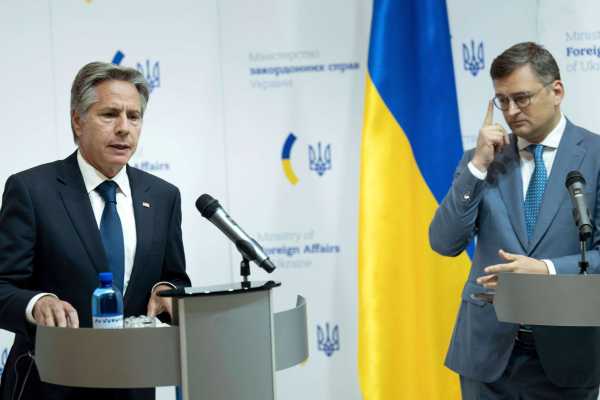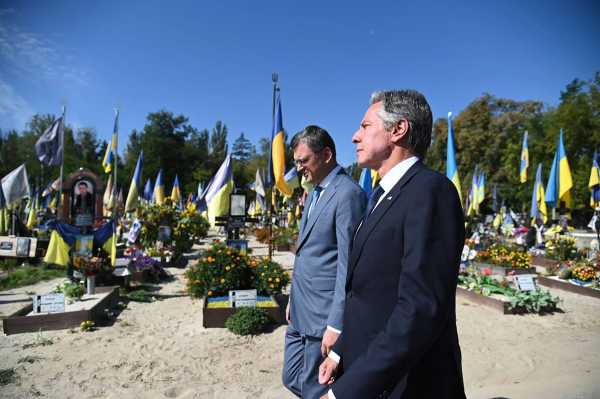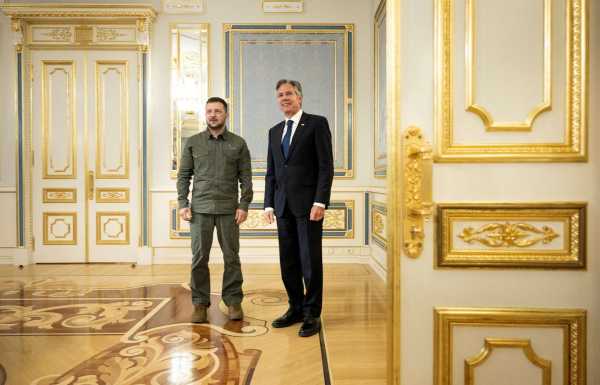Secretary of State Antony Blinken’s fourth visit to Ukraine since the war began was designed to convey unwavering American support for the invaded nation — but that message was at times overshadowed by devastating human costs of the war and the ever-present danger that Western aid may not be enough.
Like all trips into Ukraine by senior government officials, Blinken’s journey this week was a feat of painstaking planning, with the details of his travel closely guarded to prevent amplifying the inherent risk of entering a warzone.
Blinken made the trip into Kyiv by train from Poland, a trek that took all night. Then, when he finally reached the terminus of the extraordinary journey, the secretary visited a place that feels entirely ordinary to most Americans — making a quick stop at McDonald’s with his Ukrainian counterpart, Dmytro Kuleba.
Of course, sitting down at the chain’s location in Kyiv was about more that grabbing a quick bite. It was an illustration of how despite a year and a half of war, life in Ukraine presses on in small but significant ways, and it related to the world what Kuleba described as a symbol of the Western confidence in his homeland.

Ukraine’s Foreign Minister Dmytro Kuleba and Secretary of State Antony Blinken speak during a news conference at the Ministry of Foreign Affairs in Kyiv, Ukraine, Sept. 6, 2023.Pool via AP
Administration officials said Blinken’s two-day stop in Ukraine was intended to showcase the country’s resiliency. But that effort was complicated by a grim example of exactly what its people have had to endure. In the first hours of his visit, a Russian strike on a crowded market near the devastated city of Bakhmut claimed at least 17 lives.
Striking this careful balance between stressing the urgent demands of war while also attempting to showcase a country making substantial progress toward peace and potentially even greater prosperity than it experienced before the conflict is the latest diplomatic challenge confronting Blinken and other Western officials as they seek to maintain support for Ukraine amid a stuttering counteroffensive and a brewing showdown over additional U.S. funding.

In this photo provided by Ukrainian Ministry of Foreign Affairs, U.S. Secretary of State Antony Blinken, right, and Ukrainian Foreign Minister Dmytro Kuleba, walk at the Alley of Heroes at the Berkovetske cemetery in Kyiv, Sept. 6, 2023.Ukrainian Ministry Of Foreign Affairs/AP
“I have no doubt that the administration would like to highlight Ukrainian success. If you’re say, ‘We’re getting return on our investments,’ that’s more likely to sustain support for those investments. That’s logical and reasonable,” said Brad Bowman, senior director of the Center on Military and Political Power at the Foundation for Defense of Democracies and a former national security advisor to members of the Senate Armed Services and Foreign Relations committees.
“But the main difference between what [Russian President Vladimir] Putin and the Biden administration is doing is that the U.S. is constrained by facts,” he continued.
A counteroffensive hanging in the balance
In their assessments of Ukraine’s ongoing counteroffensive, American officials have largely stayed away from firm facts and figures, urging the public to consider Ukraine’s broader war efforts over any individual push.
But while in Ukraine, Blinken said he was seeing “real progress” from the country’s forces in recent weeks and noted that Ukraine has recaptured roughly 50% of the territory it lost since the war started.

Ukraine’s President Volodymyr Zelenskiy greets Secretary of State Antony Blinken before a meeting at Bankova in Kyiv, Ukraine, Sept. 6, 2023.Pool/via Reuters
The secretary also cited that same statistic nearly two months ago when asked about the counteroffensive, and some estimates claim Ukraine hit that mark in the first year of the war.
The situation on the battlefield is dynamic — but two months into the latest campaign, data shows Ukrainian territorial gains have flatlined.
“There were at times overinflated expectations,” Bowman said of the run-up to the counteroffensive. “People focused on everything the U.S. and our European allies were doing to help Ukraine, build out these brigades and better arm them and train them, but observers kind of ignored the fact that the Russians weren’t sitting on their hands during that period.”
Still, Bowman says Blinken is right to highlight recent progress, calling the gains “tactically significant” if not yet “operationally significant.”
Whether any momentum might be halted by wintery conditions on the horizon or other variables remains to be seen.
“Generally speaking, tough weather hurts the offense more than hurts the defense because when you’re out having to be mobile and expend energy, that weather can take a higher toll on you,” Bowman said.
“But really, to a large extent, what I’m talking about is morale. And I think that’s the great advantage of the Ukrainians over the Russians that is impossible to measure, but incredibly significant, and that is Ukrainians are fighting for their families in their homes,” Bowman added.
The future of funding
Back in Washington, lawmakers on Capitol Hill are also moving at a slogging pace when it comes to taking up the administration’s ask for an additional $24 billion in funding for Ukraine.
Both chambers are due to consider the supplemental request this month, but fractures within the Republican Party over supporting the measure appear to be growing deeper.
For the first time since the war began, some senior administration officials are expressing concern that Congress may refuse to approve the tranche of aid intended to support Ukraine through the first months of 2024.
While animosity has been more perceptible among conservatives in the House, some Senate Republicans are now accusing the administration of holding back assistance for Americans by tying its request for billions in disaster relief money to its petition for Ukraine.
Bowman argues that funding Ukraine’s fight is also in Americans’ best interests.
“Regardless of what happens in the next few weeks and months with a counter offensive, there’s a strong argument looking solely through the lens of American national security interests that we need to continue to support Ukraine,” he said. “History time and again tells us that what happens overseas matters at home, and that when Americans are huddled in an insular, defensive crouch and are ignoring what happens abroad, almost always we come to regret that decision later.”
Sourse: abcnews.go.com